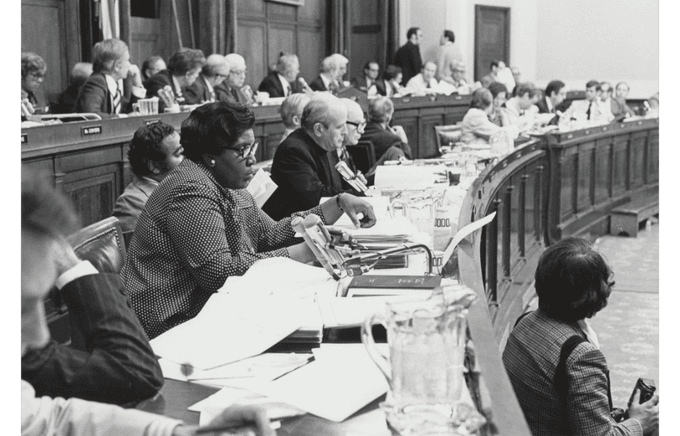Who Can Appoint a Special Counsel
How does an independent investigator get appointed?
by Caitlin Martin

Barbara Jordan (D-TX) on the House Judiciary Committee during Watergate
Ever since various agencies and Congressional committees began investigating allegations of Russian interference in our election and the relationships between the current administration’s campaign organization and the Russians, people have been calling for a special counsel (which used to be known as a special prosecutor — see also Watergate).
**Here’s how it works:
**There are a couple of ways a special counsel can be appointed.
- The U.S. Attorney General has the power to appoint a special counsel. In the case where the Attorney General has recused him or herself, the Deputy Attorney General has the power to appoint this individual, according to the Code of Federal Regulations:
§600.1 Grounds for appointing a Special Counsel.
The Attorney General, or in cases in which the Attorney General is recused, the Acting Attorney General, will appoint a Special Counsel when he or she determines that criminal investigation of a person or matter is warranted and —
(a) That investigation or prosecution of that person or matter by a United States Attorney’s Office or litigating Division of the Department of Justice would present a conflict of interest for the Department or other extraordinary circumstances; and
(b) That under the circumstances, it would be in the public interest to appoint an outside Special Counsel to assume responsibility for the matter.
Congress can also initiate a process through which a special counsel is appointed. To do this, Congress would have to pass a law requesting that a three-judge panel of members of the U.S. Court of Appeals in Washington, D.C. appoint the counsel. The last time this method was used was for the appointment of Kenneth Starr to investigate President Bill Clinton. Such a law would need to be signed by the current President, or if vetoed would need to be overridden by a two-thirds majority in both houses of Congress.
**Are there any other options?
**Yes! Congress could appointment a commission to investigate the allegations, similar to the 9/11 commission. Should Congress choose to do this, it is likely they would appoint an independent bipartisan commission of experts to investigate. Just as the 9/11 commission did, this body would produce a report. A commission like this has the power to subpoena, but has no ability to prosecute anyone.
Lastly, Congress could appoint a special congressional committee to investigate (think Watergate Committee). Such committees are usually bipartisan and are run by members of Congress. The committee would have the right to subpoena. The difference between this kind of committee and the investigations currently being conducted by the House and Senate Intelligence Committees is that the committee would only be investigating the Russia allegations, rather than investigating and handling the regular business of a congressional committee.
**Tell Congress what you think!
**Text RESIST to 50409 and let your representatives know what you think, or see what else is happening this week:
The Senate and the ACHA: What Now?
To learn more about special prosecutors, take a look at the Code of Federal Regulations:
Support the ’bot!
Upgrade to premium for AI-writing, daily front pages, a custom keyword, and tons of features for members only. Or buy one-time coins to upgrade your deliveries to fax or postal mail, or to promote campaigns you care about!
Upgrade to PremiumBuy Coins